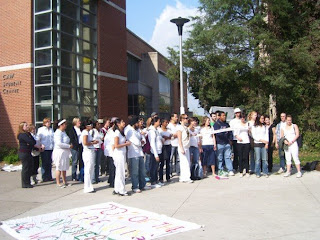
The title of this post refers to the logo pictured above. When you see this logo on a product you will know that it is fair trade certified.
You may also see this logo on Halloween! This Halloween one of my costumes will (hopefully) be this logo/person as I will be going Reverse Trick-or-Treating.
What is reverse trick-or-treating? Well I will tell you. What we're doing (my Engineers Without Borders friends and our other friends we will bring along) is going door to door an distributing fair trade chocolates to homes. This will give them a treat and some knowledge about Fair Trade- no tricks involved.
Here's some info from the website about what's going on:
"This Halloween, young people will be giving treats to the adults!
On Halloween night 2007, members of Engineers Without Borders (EWB) university chapters will be the ones doing the trick-or-treating. They'll be going door-to-door across Ontario introducing people to Fair Trade chocolate. They'll also be handing out:
- 10,000 Cocoa Camino Fair Trade chocolates
- 'Treat Fair, Trade Fair' postcards with info on how to support Fair Trade cocoa.
Fair Trade Certified products are available in stores across Canada. In choosing Fair Trade chocolate at Halloween, and every other day of the year, you are connecting with the farmers who grow and harvest your food. The guaranteed Fair Trade price paid for cocoa helps to provide farmers with a sustainable livelihood and creates hope for a better future for their children. In addition, Fair Trade certification prohibits the use of abusive child labour. Look for the TransFair Canada logo on products when you shop."
Out of the 10,000 that are being distributed in Ontario the Windsor Chapter is planning to distribute 2,000!! Imagine, 2,000 more people who know about fair trade!!! (You'll have to excuse all the exclamation marks but I'm really excited. This activity is combining my two favourite things- EWB and Halloween!!!)
For some more info on Fair Trade check out playyourpart.ca
So here are some of the reasons why I think reverse trick-or-treating is effective:
- it's very not threatening and people will be expecting "traffic" in their neighbourhood that night so they will be open to talking to people
- the info card is something that can be saved and kept as a reminder
- there is a huge audience that will be reached
- this is information that will be new to many people
- buying fair trade is something anyone can do locally to make a difference globally
- it's chocolate
This is an event that is also going on in the US so it's great to see that many, many people are getting involved and spreading the word about fair trade. This is creating awareness, one of the first steps for social change. If anyone really wants to get involved please email uwindsor@ewb.ca and we can figure something out.
If you open your door next Wednesday and find a fair trade logo, a happy farmer (happy because they're getting a living wage that is), a white band, or a fair trade chocolate bar be open to what they're saying and savour the message as much as the chocolate.






